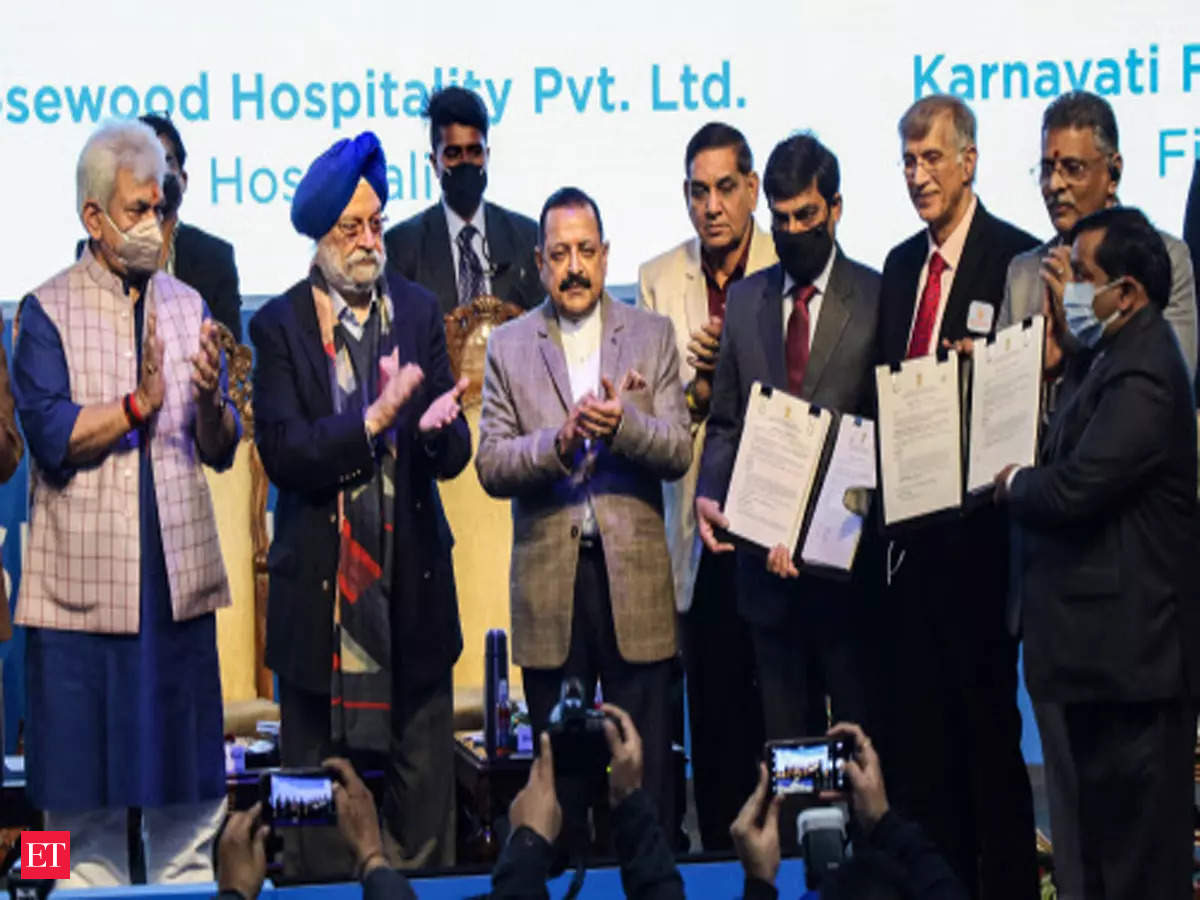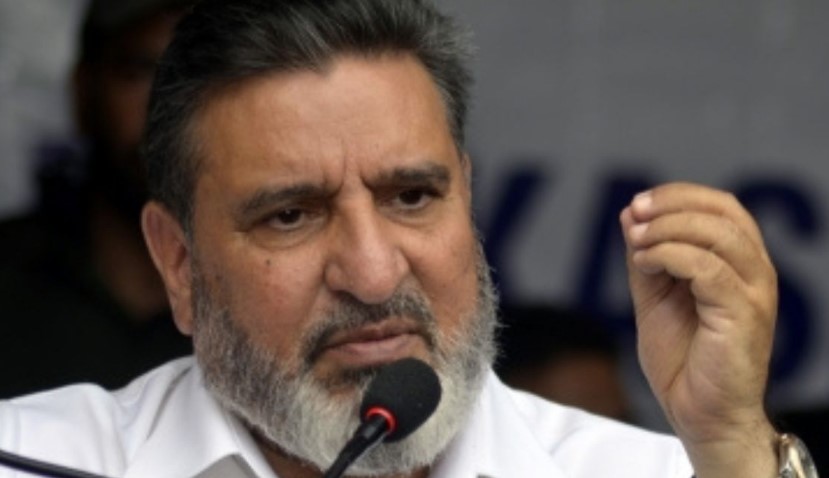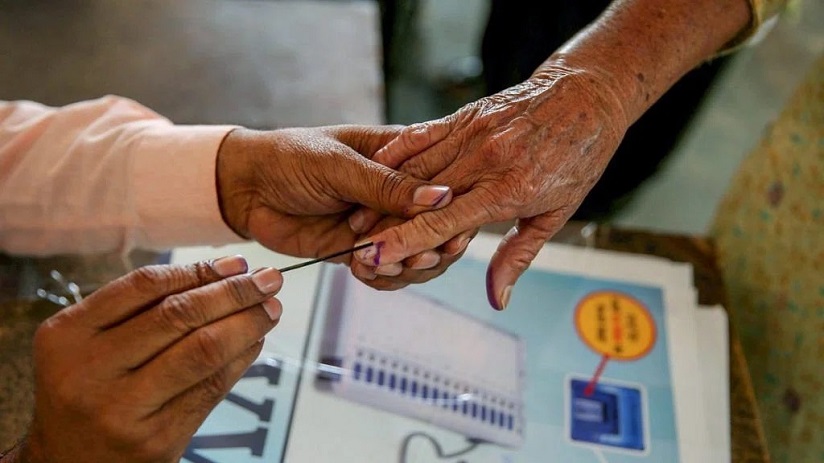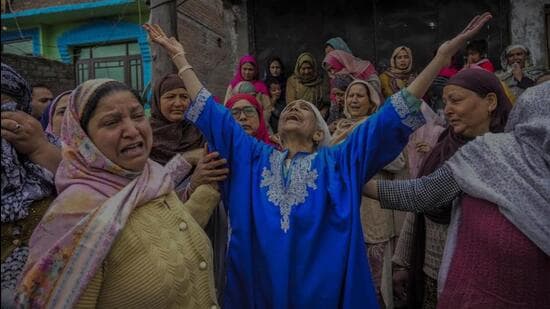Opposition parties have urged the government to focus on job creation rather than investment or selling land, given J&K is facing a massive unemployment crisis
The Jammu and Kashmir government on Monday opened the union territory to the country’s real estate investors by signing 39 MoUs worth ₹18,300 crores for the development of housing and commercial projects.
Terming the signing of the MoUs at J&K Real Estate Summit here “historic”, Lieutenant Governor Manoj Sinha said it is a major step towards the transformation of the UT. Addressing a press conference at the summit, he said the government has already implemented the realty law RERA and adopted Model Tenancy Act in UT. He emphasised that the government will consider reducing stamp duty on registration of properties and set up a single-window system for faster approval of projects.
“We have signed 39 MoUs today. We have received investments proposals of ₹18,300 crores,” he told reporters here. The summit was organised by the J&K government, Union Ministry of Housing and Urban Affairs and realtors’ body NAREDCO.
Sinha said these MoUs will help generate direct and indirect employment opportunities in J&K. He also announced that a similar real estate summit will be held in Srinagar on May 21-22 next year. Asked about opposition parties’ allegations that land parcels of the local people will be taken away in the name of development, Sinha said this is an “effort to create fear and incite people”. There will be no demographic change, he added.
The Lieutenant Governor said the real estate developers have been asked to partner with local builders of the UT. There have been revolutionary changes in J&K during the last two years, he said asserting that the UT is providing 100 per cent more incentive than Uttar Pradesh. Sinha said the government has identified 6,000 acres of land for the development of projects and that it has also made rules for change of land usage of agriculture land. He asserted that the government will also offer its own land under the new industrial policy for the development of projects.
Sinha said the people who own the land should have the freedom to decide how they want to use their land parcels. As many as 20 MOUs were signed at the summit for the development of housing projects, while 7 were inked for commercial, 4 hospitality, 3 Infratech, 3 film and entertainment and 2 finance projects. The real estate companies which have signed the Memorandum of Understanding include Signature Global, Samyak Group, Raunak Group, Hiranandani Constructions for housing projects.
Chalet Hotels Limited signed MoU for hospitality. Raheja Developers, Goel Ganga, GHP Group and Shree Naman Group signed initial pacts for housing projects.
The centre and the J&K administration held a real estate summit in Jammu (the first of its kind) to encourage people from across the country to buy land, or a second home, in Jammu and Kashmir. Outsiders – those not classified as ‘permanent residents’ – had earlier been barred from purchasing or owning land but this was changed after the centre scrapped Article 370 in August 2019, thereby removing special status for J&K.
Local protesters and regional political parties have accused the centre of “putting J&K up for sale”. Organised jointly by the Union Ministry for Housing and Urban Affairs and the J&K administration, the Jammu and Kashmir Real Estate Summit (2021) was held today. Officials said 39 MoUs, or Memorandum of Understandings, were signed; 19 dealt with the construction of residential homes.
Calling it a “historical transformation in J&K”, the government said it had changed laws to allow external investment in J&K – including the purchase of non-agricultural land. Lt Governor Sinha has said a similar event will be held in Srinagar in May next year. “Under the new J&K Development Act, the term ‘being a permanent resident of the State’ as a criteria has been omitted, paving the way for investors outside J&K to invest,” the agenda for today’s conference said.
“As a result, any citizen of India can buy non-agriculture land in J&K,” it said. Last week the J&K administration, headed by Lieutenant Governor Manoj Sinha, changed land use laws and allowed re-classifying agricultural land for non-agricultural purposes. The decision triggered strong criticism from regional parties, who said the land would be used to settle non-locals.
Recently the centre told Parliament that only seven plots of land had been purchased in J&K following the scrapping of special status. Allowing people from outside J&K to buy land in the UT was one of the major talking points for the BJP and the centre, but so far that doesn’t seem to be the case.
Opposition parties have urged the government to focus on job creation rather than investment, given J&K is facing a massive unemployment crisis. According to a recent Centre for Monitoring Indian Economy (CMIE) unemployment survey, J&K’s unemployment rate is over 21 per cent. The all-India average is 7.8 per cent.
Meanwhile, just a few kilometres down the road there were protests against the summit and demands for the restoration of constitutional safeguards and statehood. “This will not be acceptable to my party or the people of J&K. Having said that, the moot point is (to ask) what necessitated the government to omit the domicile requirement…” Altaf Bukhari, President, Apni Party, said.
“J&K is being put up for sale. They are trying to change our demography, history, identity and culture. We don’t accept any such development which changes the character of J&K. They are auctioning J&K,” Sunil Dimple, President of Mission Statehood J&K, said.
Recently, the J&K administration was forced to suspend its decision to privatise the power sector, including transmission, after 20,000 employees – who alleged government resources were being systematically sold off – went on strike. The Army had to be called in to operate grid stations.






